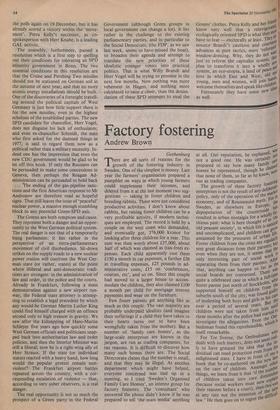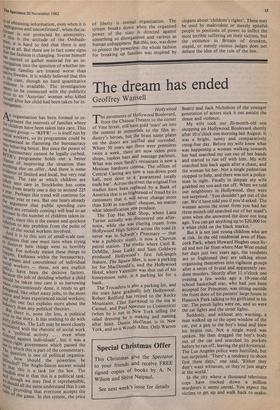Factory fostering
Andrew Brown
Gothenburg
There are all sorts of reasons for the growth of the fostering industry in Sweden. One of the simplest is money. Last year the farmers' organisation prepared a pamphlet on ways in which young farmers could supplement their incomes, and deleted from it at the last moment two sug- gestions — taking in foster children and breeding rabbits. These were not considered productive activities. I don't know about rabbits, but raising foster children can be a very profitable activity, if modern techni- ques are employed. The record is held by a couple on the west coast who demanded, and eventually got, 376,000 kronor for looking after three children for a year. This sum was then worth about £37,000, about half of which was claimed as (tax-free) ex- penses. Each child apparently cost them £130 a month in car expenses, a further £26 in travelling expenses, £25 pounds in ad- ministrative costs, £15 on 'conferences, courses, etc', and so on. Since this couple had moved to a larger house to accom- modate the children, they also claimed £100 a month per child for mortgage interest payments and wear on the furniture.
Few foster parents get anything like as much as this couple. The vast majority are probably underpaid idealists (and imagine their sufferings if a child they have taken to their hearts turns out to have been wrongfully taken from the mother). But a number of 'family care homes', as the large-scale enterprises are known in the jargon, are run as trading companies, for tax reasons. It is difficult to discover how many such homes there are. The Social Directorate claims that the number is small, and that they may be illegal. At another department which might have helped, everyone concerned was tied up in a meeting, so I tried 'Sweden's Organised Family Care Homes', an interest group for factory fosterers. The 'consultant' who answered the phone didn't know if he was prepared to tell 'the mass media' anything
at all. Our reputation, he explained, w!snot not a good one. He was certainly prepared to say how many familY .c a homes he represented, though he clalli;re that none of them, so far as he knew, ere that
as trading companies.
The growth of these factory fosteride enterprises is not the result of any delibeiltet policy, only of the operation of the Inaric.ri economy, and of Rousseauist myth. F° the Sweden, as elsewhere in Europe, has depopulation of the countryside resulted in urban nostalgia for a whollY titious past: what is here thought of as 1,01 old peasant society', in which life is Ott'', and uncomplicated, and children can g1,13,e. untainted by the pressures of urban ly Foster children from the cities are regular.; sent great distances from their parents; tioue even when they are not, it seems that: is only interesting part of social wor:ftei separating them from their parents. r";he that, anything can happen so far as social boards are concerned. There v16.; quite a celebrated case in which a full-tifntio foster parent just north of Stockholm, the supported himself on children from ;0 suburbs south of the city, was found gulare of molesting both boys and girls in his ethe over a period of several years. But no children were not taken from hill' _Au- to three months after the police had starts to• investigate the allegations. Even the ,,his itself remarkable. afrokuanbdt. "/"his reprehensible, '' orh° For Tor Sverne, the Ombudsman eal, deals with such matters, does not seem r ly to have grasped the idea that the the dividual can need protection even from a enlightened state. I have in front of law book that he co-authored on the Pegindier on the care of children. Amongst "„ber things, we learn from it that `if the nu':"145 of children taken into care diMinlair, (because social workers must now exP.4 their reasons before a court), then thies at any rate not the intention of th law.' He then goes on to regret the &filo' t‘Y of obtaining information, even when it is ambiguous and unconfirmed', when the in- rrner is not protected by anonymity. 'f this is the attitude of the Ombuds- hillan, it is hard to feel that there is any "°Pc at all. But there are in fact some signs hat the fashion is changing. Sverne himself as started to gather material for an in- vestigation into the question of whether im- inigrant families are treated worse than is the native Swedes. It is widely believed that this case, though no hard quantitative evidence is available. The investigation s!eras to be connected with the publicity lIven to an 'Assyrian' woman who killed herself after her child had been taken for in An organisation has been formed to re- v. present the interests of families where 'le children have been taken into care. This Pressure group — `RFFR' — is itself run by
summarised workers, so its programme could be
iuMmarised as flattering the bureaucracy tilkto behaving better. But since the power of ir bureaucracy cannot be legally curbed, chFPR's programme holds out a better an4„11Lee of improving the situation than ell:4'141g else on offer. And there is some s'idence of limited and local, but very real buLecess. The rate at which children are ataken into care in Stockholm has come (3‘va from nearly one a day to around 225 anYear. Perhaps this trend will continue for he Cher year or two. But one hears already (,;,,,argament that public spending cuts 'itch are certainly coming) will lead to an 1ern.,- • eu.w in the number of children taken in- soicare, since this is the easiest and quickest vi.uion to any problem from the point of s'w of the social workers involved. s: .And it is to this sort of small-scale con- to'aeration that one must turn when trying discover how things went so horribly har,cirig- For nobody meant these things to th"ea. Fashions within the bureaucracy, sper,;19,111rns and convenience of individual 13,.,;:al workers — these not any explicit 15,"I'eY, have been the, decisive factors. s7ause the job of deciding whether a child upld be taken into care is so harrowing del conscientiously done, it tends to get ill !Sated, like other nasty jobs, to the most a„rior and least experienced social workers; in"ciu this one fact explains more about the bustrY than any political theories. twiat there is, none the less, a political Nisi to the story. It has nothing to do with as:tY Politics. The Left may be more closely a:° elated with the rhetoric of social work `Political activity ... even when cenected against individuals', but it was a law to-right government which passed the The t° Which this is part of the commentary. tioilquestion is one of political organisa- def. how should the powerless be ended? The Anglo-Saxon answer would iv that this is a task for the law. The aolvdedish one is that this is a political task; we jbougb we may find it reprehensible, worsrilicl all the same understand that it can tiles 4, Providing that everyone accepts the es of the game. In this system, the price of liberty is eternal organisation. The system breaks down when the organised power of the state is directed against something so disorganised and various as human unhappiness. But this, too, was done to protect the powerless: the whole fashion for breaking up families was inspired by
slogans about 'children's rights'. These may be used by malevolent or merely spiteful people in positions of power to inflict the most terrible suffering on their victims, but the existence in Britain of drunken, stupid, or merely vicious judges does not debase the idea of the rule of the law.











































 Previous page
Previous page